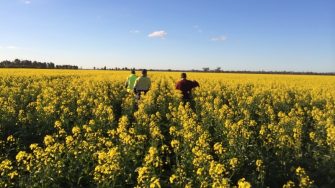Four PhD positions available: The role of Biosolids Management in preserving Earth’s resilience
Four PhD positions are currently available under Theme 3B within the ARC Training Centre for the Transformation of Australia’s Biosolids Resource.
Four PhD positions are currently available under Theme 3B within the ARC Training Centre for the Transformation of Australia’s Biosolids Resource.

The most common end use of biosolids in Australia is application to agricultural land, providing a range of benefits including carbon sequestration, increasing water holding capacity, and providing nitrogen, phosphorus and micronutrients to the soil. Additional benefits of biosolids management, in terms of renewable energy generation, chemical fertiliser offsetting and increased drought resilience, whilst acknowledged have not been comprehensively investigated in an Australian context. This project aims to develop a generic and flexible framework for the solids processing train of existing and new biosolids treatment technologies. It will also develop pathways to enable the comparison of alternative technologies. An existing innovative, economy-wide hybrid life cycle assessment tool will be adapted to enable Triple Bottom Line assessments for advanced transformation of biosolids and its management.
Four PhD positions are currently available under Theme 3B within the ARC Training Centre for the Transformation of Australia’s Biosolids Resource (Click on the respective headings below for detailed project information contained in a pdf attachment):
1. Modelling nutrients and substances in wastewater treatment plants and biosolids
This PhD project aims to:
2. Life cycle assessment of biosolids processing technologies
This PhD project aims to:
3. Hybrid life cycle assessment of biosolids processing technologies
This PhD project aims to:
4. Co-digestion of organic substrates in Australian wastewater treatment plants
This PhD project aims to:
Three other PhD positions are currently available under Theme 3A, 3C, and 3D within the ARC Training Centre for the Transformation of Australia’s Biosolids Resource:
5. Fate of emerging contaminants following biosolid application? This PhD project aims to:
6. Siloxane mapping and behaviours in energy recovery from anaerobic digestion: This PhD project aims to:
7. Community engagement to improve biosolids acceptance: This PhD project aims to:
The ARC Training Centre for the Transformation of Australia’s Biosolids Resource (https://www.transformingbiosolids.org.au) aims to bring together Australia’s leading biosolids researchers and key industry and government stakeholders to advance the management, transformation, and reuse of biosolids in agriculture.
Successful candidates will join the UNSW Water Research Centre (WRC) and the ARC’s Industrial Transformation Training Centres (ITTC) program. Candidates should have backgrounds in either civil, chemical or environmental engineering, and have the ability to conduct independent research with limited supervision, with excellent written and communication skills, and will be expected to interact regularly with industry partners. Knowledge of sustainability assessment methods (e.g. material/substance flow analysis, life cycle assessment, input-output analysis and hybrid life cycle assessments) is not required but will be beneficial for this position. Candidates need to be successful in securing their own primary scholarship via a Research Training Program (RTP) – Domestic or University International Postgraduate Award (UIPA) or any equivalent. A secondary Top Up scholarship ($5,000) may be available to exceptional applicants.
Applications should be submitted to Prof Tommy Wiedmann (email: t.wiedmann@unsw.edu.au) with the subject heading “ITTC PhD 3B” and indicating your specific project of interest (Projects 1, 2, 3 or 4 outlined above), along with a cover letter, academic transcript, and CV. Please submit your application by 31 August 2022 to the email address above. This is to ensure that applicants can apply for an RTP scholarship (which closes 30 September 2022) in time to commence their PhD in T1, 2023.